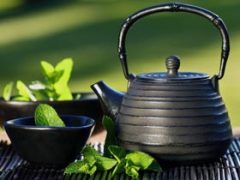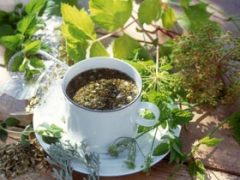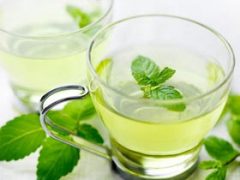
Irritable bowel syndrome (IBS) is a very common medical condition that results in abdominal discomfort, pain, cramping and bowel movement problems. There is no cure for IBS, and most people manage the disorder through dietary and lifestyle changes which can result in a reduction in symptoms. There are many herbs found in nature that can help digestion along and reduce the symptoms of irritable bowel syndrome. Many people enjoy these herbs in tea form alongside lifestyle changes like better dietary choices and an increase in physical activity. Tea for IBS may seem like a stretch, however at least five herbs can help reduce the abdominal discomfort associated with the condition. We will explore them below and explain how they can help alleviate some IBS symptoms.
1. Ginger
Ginger is well known for its ability to aid in digestion and reduce symptoms like nausea. Oils found in ginger root, called zingiberine and zingiberole, are thought to communicate with the colon and decrease cramping. A tea for IBS can be made with ginger in a decoction form, with small, smashed pieces of root being boiled in water. The brew can be sweetened with honey for extra flavor. Ginger also makes a welcome addition to many herbal tea recipes and works well with other herbs that aid the digestive system.
2. Mint
There is more to the after dinner mint than most people think. While mint can be very effective at reducing post-meal bad breath and can help aid digestion too. The menthol that is found in mint can reduce cramping and bloating and may also be able to counteract flatulence, diarrhea and constipation too. Both peppermint and spearmint are acceptable in this application of a tea for IBS, and they both make tremendously flavorful teas.
3. Fennel
Fennel is typically associated with culinary applications, but that does not mean that it has not been used for a very long time medicinally as well. Fennel’s role in IBS relief has to do with the way in which it helps the body comfortably have bowel movements. One of the most common symptoms of IBS is constipation, and the mucus producing action of fennel can make having one much gentler and more comfortable. Crushed fennel seeds can be added to a tea for IBS and typically the seeds are used alongside other natural digestive aids in herbal tea recipes as opposed to stand alone concoctions.
4. Cardamom
Bloating is a very common symptom of IBS, and it can also be one of the most uncomfortable. Cardamom contains essential oils that are thought to boost the production of digestive enzymes which makes the digestive process easier and can lead to less bloating. Cardamom pods can be smashed and then ground, with the resulting powder added to a tea for IBS. Honey works well as an additive in teas and syrups containing cardamom and can provide a soothing element to the mix.
5. Cinnamon
Cinnamon has a wealth of medicinal uses and many of them are related to digestion thanks to the spice’s contained compound eugenol. This herb is considered a mild form of natural pain relief and effective against cramping. Eugenol is also thought to be effective at controlling diarrhea, which not only can cause cramping and discomfort but bloating too. Cinnamon can be added to any tea for IBS and adds a familiar and comforting flavor in addition to its many digestive benefits.
Irritable bowel syndrome is not a serious condition, but it can cause daily symptoms that can make everyday activities more challenging. Changes in lifestyle and diet can be very helpful, but adding some herbal remedies from nature can provide a supplemental boost. Enjoying a hot cup of tea for IBS won’t feel like therapy at all, just a relaxing way to tastefully aid digestion and relieve bothersome symptoms.





